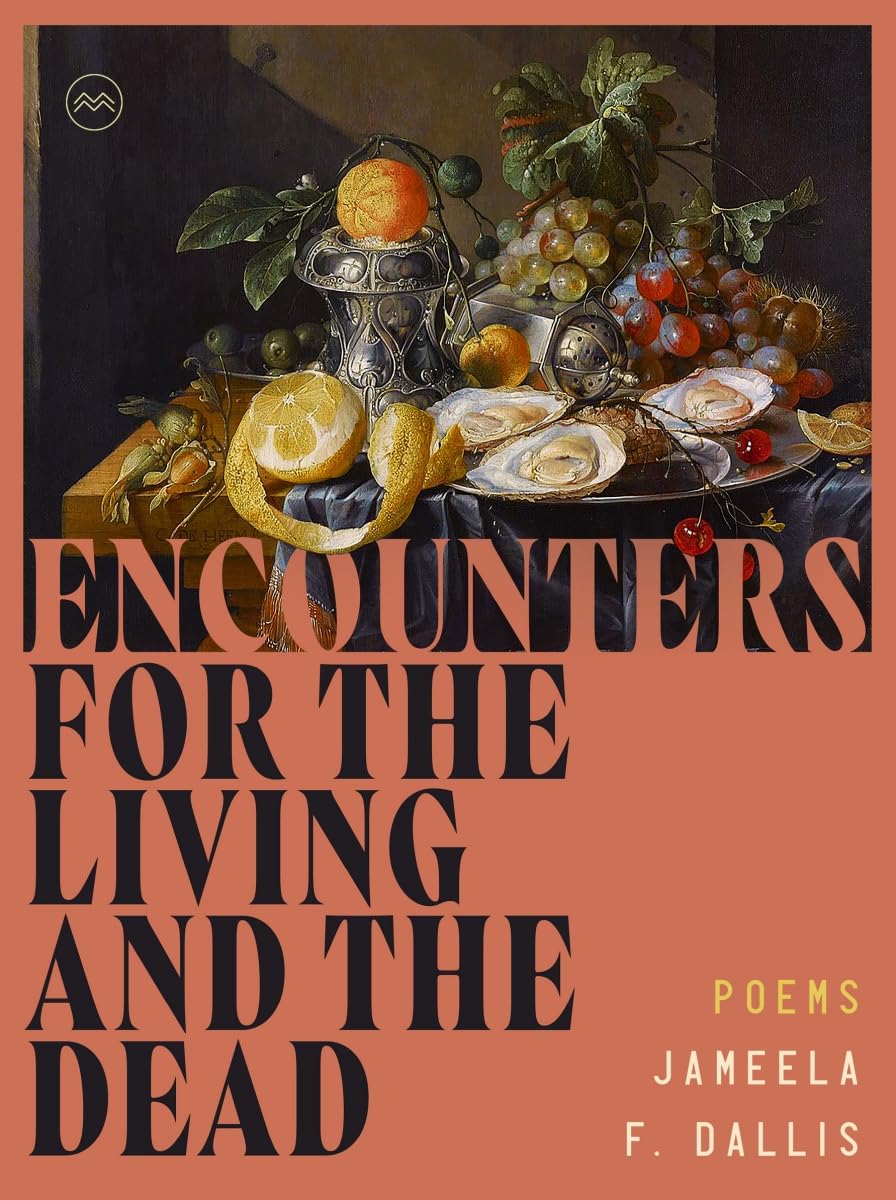Review of Encounters for the Living and the Dead by Jameela F. Dallis

Encounters for the Living and the Dead
Jameela F. Dallis
River River Books, 2025, 106 pages
$18.00
Reviewed by Beth Brown Preston
Encounters for the Living and the Dead is a first collection of poetry by Jameela F. Dallis. She opens this rich and fecund poetic exploration with an epigraph quoted from bell hooks’ All About Love: New Visions: “No matter what has happened in our past, when we open our hearts to love we can live as if born again, not forgetting the past but seeing it in a new way, letting it live inside us in a new way” (hooks, 129). With this epigraph, the poet introduces us to the organic function of memory and the connection to our past as she both mourns and celebrates our ancestors, grandmothers, cousins, and friends. She continues: “Altarworks are poems for people who’ve passed on—some I’ve known and loved. I imagine the poems being a part of an altar thick with candles and melted wax like my own” (85).
The presence of death in life, appearing like a pearl inside an oyster, forms a recurrent theme in her work, as in her poem titled “Three of Swords”:
I remember smelling the sweat, the turpentine— / that scent that was always always reminding me that you would die. / That scent the shape of something rotten, maybe fecund, / but still something I wish I could walk into again— / its memory is something that resurrects / my worry for you and then dissolves (11).
An oyster appears in many of her poems as a symbol of the poet’s eternal love for the sea. For example, in her poem “See Me Now,” the poet describes the fortune she had to cross the ocean four times, to travel throughout Europe, and to dine on gourmet food in many countries. She relishes seafood as she feeds her imagery: “Himalayan black salt / and pink rare salmon swim into / the silver threads of memory” in “I, Origin” (19). Jameela writes of her insistent love for the food and memories of the sea: “Holding onto my oyster dreams / nowhere to be / released from weighty history I gather my dreams / sup at your banquet” in “Oyster Dreams” (38).
Ekphrastic verse pervades this lush collection. Jameela writes poems to celebrate the paintings of artists like Henri Matisse and Robert Motherwell. She devotes the entire section three to “Ekphrastic Encounters”—poems in tribute to the work of other artists from David Bowie to Helen Frankenthaler. In the Notes, she records:
Henri Matisse’s ‘Les Betes De La Mer (1950)’ inspires not only the eponymous poem but resonates throughout the entire second part. In what feels like kismet, in high school, I completed a master copy of Matisse’s work when I thought I’d become a professional visual artist one day. . . Thus, passionate love, heartbreak, cheekiness, and more research into marine life than I ever imagined imbue this. . . book (86).
This fine debut collection is presented with the blessing of poets—Gabrielle Calvocoressi, Jaki Shelton Green, Alexis Pauline Gumbs, Emilia Phillips, and Jameela’s “mentors, teachers, professors, advisors, family members, and benevolent ancestors. . .” (90). Gabrielle Calvocoressi has written about Dallis: “So few of us are willing to experience life fully if it means being confronted with our deepest hungers and the deep harms we have been forced to live through. So few of us can sit with the living and the dead with the kind of generosity that Dallis does, the deep curiosity, the love” (Praise).
The poet Jameela F. Dallis is a resident of Durham, North Carolina. Her publications include poetry, interviews, art criticism, and literary scholarship. Her work has appeared in prestigious journals such as Feminist Studies, Honey Literary, and The Fight and the Fiddle under the auspices of the Furious Flower Poetry Center. Jameela holds a B.A. in English from the University of New Mexico in Albuquerque and an M.A. and Ph.D. in English from the University of North Carolina at Chapel Hill.
Beth Brown Preston is a poet and novelist. A graduate of Bryn Mawr College and the MFA Writing Program of Goddard College, she has been a CBS Fellow in Writing at the University of Pennsylvania and a Bread Loaf Scholar. Her work has appeared and is forthcoming in many literary and scholarly journals.
"Empowerment comes from ideas."
― Charlene Carruthers
"Your silence will not protect you."
— Tourmaline
"Gender is the poetry each of us makes out of the language we are taught."
— Leila Raven


